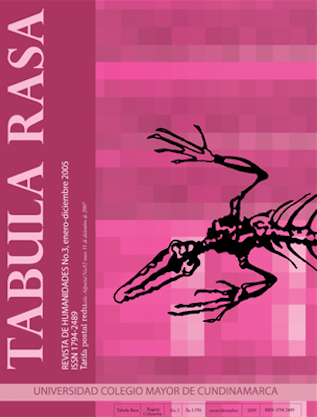Show authors biography
The end of the Cold War seemed to promise the end of a geopolitical praxis based upon theexclusion of difference. Theorists talked of fluidity, hybridity and an increasingly borderlessworld. However, the aftermath of September 11th showed all too clearly the persistent holdof images of a dangerous world where boundary maintenance was vital to security. While itwill initially focus on a critique of the texts and scripts of the geopolitics of the «war againstterror» in the spirit of «critical geopolitics», this paper will go on to develop a feministgeopolitics which puts bodies and everyday practices at the centre of geopolitics.
Article visits 331 | PDF visits 131
Downloads
Amnesty International. 2004. «Campaign to stop violence against women», http:// www.amnesty.org.uk/deliver/document/15231, accessed 5/7/05.
Anzaldúa, G. 1987. Borderlands/La Frontera: the new mestiza. San Francisco: Spinsters / aunt lute.
Aziz, S. 2004. «Viewpoint: why I decided to wear the veil». BBCi news, http//:www.bbc.co.uk/ go/pr/fr/-/1/hi/talking_point/3110368.stm, viewed 3/2/04.
Beeson, M y A. Bellamy. 2003. «Globalisation, security and international order after 11 September». Australian Journal of Politics and History 49(3).
Brunn, S. 2003. «11 September and its aftermath: introduction». Geopolitics 8(3): 1-15.
Bush, George, W. 2001. «Address to a Joint Session of Congress on Terrorist Attacks», 20/ 9/01, accessed 28/7/05.
Chomsky, N. 2002. «Terror and just response», http://www.zmag.org/content/ print_article.cfm?itemID=2064&sessionID=11, last visited 5/7/05.
Dalby, S. 1994. «Gender and critical geopolitics: reading security discourse in the new world order». Society and space 12:525- 542.
Der Derian, J. 2001. Virtuous war: mapping the military-industrial-media-entertainment complex, Boulder, CO: Westview Press
DerDerian, J. 2002. «The war of networks». Theory and event 5:4.
Dowler L y J. Sharp. 2001. «A feminist geopolitics?» (editorial for special issue) Space and Polity 5(3): 165-176.
Enloe, C. 1989. Bananas, beaches and bases: making feminist sense of international relations. Berkeley: University of California Press.
Enloe, C. 1993. The morning after: sexual politics at the end of the cold war. Berkeley: University of California Press.
Game Info. 2003. «America’s 10 Most Wanted Coming to Consoles in 2004», Posted on Friday, December 05 2003 @ 23:28:18 EST by xbox, http://www.xboxsolution.com/ article1083.html, viewed 5/7/05.
Haraway, D. 1988. «Situated knowledges: the science question in feminism and the privilege of partial perspective», Feminist studies 14: 575-99.
Huntington, S. 1993. «The clash of civilizations?» Foreign Affairs 72(3): 22-49.
Hyndman, J. 2003. «Beyond either/or: a feminist analysis of September 11th». ACME 2(1).
Kaplan, R. 2000. The coming anarchy: shattering the dreams of the post cold war. New York: Random House.
Kwan, M-P. 2002. «Feminist visualization: re-envisioning GIS as a method in feminist geographical research». Annals, Association of American Geographers 92(4): 645-661.
Lévy, B-H. 2004. «Off with their headscarves». The Sunday Times 1/2/04, p.5.2.
McDowell, L. 1999. Gender, Identity and Place: understanding feminist geographies. Minneapolis, University of Minnesota Press.
Mearsheimer, J. 1990. «Why we will soon miss the Cold War» The Atlantic 266(2): 35-50.
Mitchell, D. 2003. The rights to the city. London: Guilford.
Ó Tuathail, G. 1996. «An anti-geopolitical eye: Maggie O’Kane in Bosnia, 1992-93». Gender, place and culture 3(2), 171-185.
Ó Tuathail, G. y Luke, T. 1994. «Present at the (dis)integration: deterritorialization andreterritorialization in the new wor(l)d order». Annals, Association of American Geographers 84(3): 381-398.
Pain, R. 1991. «Space, sexual violence and social control: integrating geographical and feminist analyses of women’s fear of crime». Progress in Human Geography 15, 4, 415-31.
Rich, A. 1986. Blood, bread and poetry: selected prose 1979-1985. New York: Norton.
Roy, A. 2002. «Come September». http://www.zmag.org/content/ print_article.cfm?itemID2404§ionID=15, visited 1/3/04.
Said, E. 2001. «The clash of ignorance», http://www.zmag.orn/saidclash.htm, visited 1/3/04. Sassen, S. s.f.. «Entrapments rich countries cannot escape: governance hotspots», People’s Geography Project, http://www.peoplesgeography.org/Sassen.html, visited 5/7/05.
Smith, N. 2001. «Ashes and aftermath». The Arab World Geographer forum on 11 September Events.
Sparke, M. 1998. «Outside inside patriotism: the Oklahoma bombing and the displacement of heartland geopolitics». en Ó Tuathail, G. y S. Dalby (eds). Rethinking Geopolitics. 198-239.
London: Routledge.
Tickner, J.A. 2002. «Feminist perspectives on 9/11». International studies perspectives 3: 333-350.
Valentine, G. 1989. «The geography of women’s fear». Area 21, 385-90.
Young, I. M. 2003. «Feminist reactions to the contemporary security regime». Hypatia 18(1): 223-231.
Zehfuss, M. 2003. «Forget September 11». Third World Quarterly 24(3): 513-528.
Zuhur, S. 1992. Revealing reveiling: Islamist gender ideology in contemporary Egypt. State University of New York Press.




